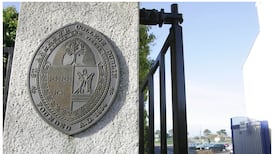Treacy -v- Roche & Anor
High Court
Judgment on February 27th, 2009 by Ms Justice Laffoy
Judgment
The bill of costs of the former solicitors of the plaintiff should be referred for taxation, and the new solicitors should provide an undertaking to the former solicitors on their bill of costs. The former solicitors should hand over all documents relating to the case, without prejudice to their lien on the documents.
Background
The case arose out of a dispute over the beneficial interest in a public house and dwelling house, which had been in the joint tenancy of Pamela Treacy, and her mother, Mary Josephine McDonagh, who died in 2003.
The proceedings had begun in 2001, and Len and Hilary Roche, who are solicitors, were the executors of Mrs McDonagh’s will. The main proceedings concern the plaintiff seeking a declaration that a deed of severance purporting to sever the joint tenancy of Mrs McDonagh and Mrs Treacy was void and to no effect, and that she is entitled to the sole beneficial interest in the property.
The proceedings were therefore against Mr and Ms Roche.
This case was an application seeking an order that the plaintiff’s former solicitors hand over her file to her new solicitors.
The plaintiff had instructed a firm of solicitors, Malcolmson Law, to take the proceedings against Mr and Ms Roche.
In the course of the proceedings she disagreed with their advice. She wished to pursue an allegation of professional negligence against Mrs McDonagh’s solicitors relating to the deed of severance.
The solicitors felt compromised for a number of reasons, including that they did not wish to be involved in an allegation of professional negligence against a firm who practised in the same locality.
In December 2007 the former solicitors decided not to continue to act for the plaintiff. They offered to transfer the file subject to an undertaking from the new solicitors in relation to their costs, and the preservation of their lien with a charge on the property.
Mrs Treacy engaged new solicitors in July 2008.
The former solicitors pointed out that they had undertaken a considerable amount of work in relation to the advancement of the proceedings over a period of five years and had incurred outlay. They wanted a methodology put in place to protect their financial exposure and ensure the speedy transfer of the file to the new solicitors.
The bill up to December 2007, including counsel fees and VAT, amounted to €57,926.62, of which €12,442.68 had been paid.
Ms Treacy contested their bill, and they proposed that the bill of costs be taxed if there was no agreement.
Ms Treacy complained to the Law Society about her former solicitors, in particular the amount of the bill, which she considered excessive. While her complaints have not been finally processed, due to these proceedings, the Law Society’s Complaints and Client Relations Committee recommended that the bill of costs be referred to the Taxing Master.
The new solicitors agreed to represent the plaintiff in July 2008 and sought delivery of the file. They proffered an undertaking to preserve the former solicitors’ lien and return the documentation to them at the end of the litigation.
The plaintiff did not execute the requisition for taxation, and was not agreeable to furnishing any other security for the costs.
One of the main issues in this action was who had initiated the end of the relationship between the former solicitors and the plaintiff, as the law distinguishes between two situations in which a solicitor may be discharged while the proceedings are ongoing.
The first is where the client terminates the solicitor’s retainer, and the solicitor is then entitled to rely on his lien until his fees and outlay have been discharged. The second is where the solicitor, with good cause, terminates the retainer.
The court may then order the solicitor to hand over the papers to the client’s new solicitor in order to allow the litigation to proceed, provided the new solicitor undertakes to preserve the former solicitor’s lien and return the papers at the end of the litigation.
The other issue was whether there were exceptional circumstances which would require the plaintiff to provide security for the costs that had accrued, as the former solicitors contended.
The plaintiff claimed that it was the former solicitors, not her, who had decided to discharge their retainer and end the relationship. The former solicitors claimed that the retainer had been “constructively terminated” because she had refused to accept the professional legal advice that had been given to her.
Decision
“It is impossible to conclude that there was a constructive termination of the former solicitor’s retainer even if . . . the concept of constructive termination could be said to exist,” Ms Justice Laffoy said.
“What is clear is that it was the former solicitors who precipitated the termination of the retainer.”
The proper approach to adopt was that they terminated their retainer for good reason.
Turning to the bill of costs, she said it was only at the hearing of this application that the plaintiff conceded she would execute the requisition to tax the costs. “There was no justification in the plaintiff refusing to execute the requisition to tax in circumstances where she has disputed the amount of the bill of costs,” Ms Justice Laffoy said.
Because the time for referring the matter had elapsed, through this inaction of the plaintiff, Ms Justice Laffoy made an order referring the bill of costs for taxation. She said justice did not require that the plaintiff gave security to the former solicitors for the costs as they would ultimately be decided before her new solicitors could receive her file.
When the bill of costs has finally been taxed, the former solicitors could take whatever steps they considered appropriate to recover them.
The new solicitors needed the documents to prosecute the main proceedings, which are over seven years old.
She therefore made orders that the bill of costs go to the Taxing Master, that the plaintiff take all reasonable steps to facilitate this, and that the documents be handed over to the new solicitors subject to an undertaking from them preserving the former solicitors’ lien, and to hand them back when the proceedings were finalised.








